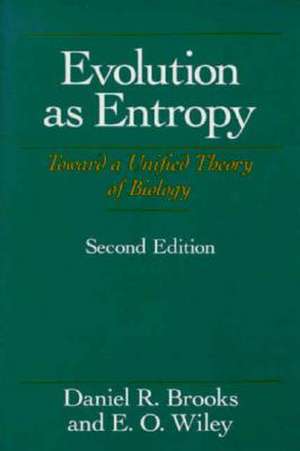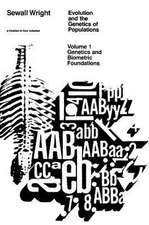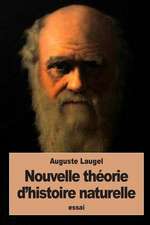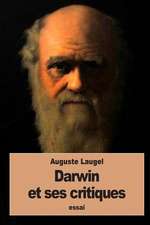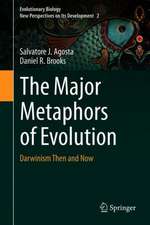Evolution As Entropy: Toward a Unified Theory of Biology: Science and Its Conceptual Foundations series
Autor Daniel R. Brooks, E. O. Wileyen Limba Engleză Paperback – 30 sep 1988
"By combining recent advances in the physical sciences with some of the novel ideas, techniques, and data of modern biology, this book attempts to achieve a new and different kind of evolutionary synthesis. I found it to be challenging, fascinating, infuriating, and provocative, but certainly not dull."—James H, Brown, University of New Mexico
"This book is unquestionably mandatory reading not only for every living biologist but for generations of biologists to come."—Jack P. Hailman, Animal Behaviour, review of the first edition
"An important contribution to modern evolutionary thinking. It fortifies the place of Evolutionary Theory among the other well-established natural laws."—R.Gessink,TAXON
"This book is unquestionably mandatory reading not only for every living biologist but for generations of biologists to come."—Jack P. Hailman, Animal Behaviour, review of the first edition
"An important contribution to modern evolutionary thinking. It fortifies the place of Evolutionary Theory among the other well-established natural laws."—R.Gessink,TAXON
Din seria Science and Its Conceptual Foundations series
-
 Preț: 230.35 lei
Preț: 230.35 lei -
 Preț: 455.04 lei
Preț: 455.04 lei -
 Preț: 431.17 lei
Preț: 431.17 lei -
 Preț: 288.59 lei
Preț: 288.59 lei -
 Preț: 294.80 lei
Preț: 294.80 lei -
 Preț: 231.00 lei
Preț: 231.00 lei -
 Preț: 191.68 lei
Preț: 191.68 lei -
 Preț: 274.82 lei
Preț: 274.82 lei -
 Preț: 443.89 lei
Preț: 443.89 lei -
 Preț: 358.60 lei
Preț: 358.60 lei -
 Preț: 301.88 lei
Preț: 301.88 lei -
 Preț: 498.55 lei
Preț: 498.55 lei -
 Preț: 392.61 lei
Preț: 392.61 lei -
 Preț: 347.24 lei
Preț: 347.24 lei -
 Preț: 320.04 lei
Preț: 320.04 lei -
 Preț: 448.30 lei
Preț: 448.30 lei -
 Preț: 389.89 lei
Preț: 389.89 lei -
 Preț: 317.33 lei
Preț: 317.33 lei -
 Preț: 496.35 lei
Preț: 496.35 lei -
 Preț: 435.78 lei
Preț: 435.78 lei -
 Preț: 401.43 lei
Preț: 401.43 lei -
 Preț: 447.32 lei
Preț: 447.32 lei -
 Preț: 387.98 lei
Preț: 387.98 lei -
 Preț: 233.11 lei
Preț: 233.11 lei -
 Preț: 385.65 lei
Preț: 385.65 lei -
 Preț: 331.75 lei
Preț: 331.75 lei -
 Preț: 270.07 lei
Preț: 270.07 lei -
 Preț: 268.20 lei
Preț: 268.20 lei - 15%
 Preț: 194.45 lei
Preț: 194.45 lei - 22%
 Preț: 689.51 lei
Preț: 689.51 lei - 23%
 Preț: 583.39 lei
Preț: 583.39 lei - 10%
 Preț: 306.24 lei
Preț: 306.24 lei - 15%
 Preț: 264.92 lei
Preț: 264.92 lei
Preț: 352.99 lei
Nou
Puncte Express: 529
Preț estimativ în valută:
67.54€ • 70.90$ • 56.06£
67.54€ • 70.90$ • 56.06£
Carte tipărită la comandă
Livrare economică 10-24 aprilie
Preluare comenzi: 021 569.72.76
Specificații
ISBN-13: 9780226075747
ISBN-10: 0226075745
Pagini: 429
Dimensiuni: 152 x 226 x 25 mm
Greutate: 0.54 kg
Ediția:Second Edition
Editura: University of Chicago Press
Colecția University of Chicago Press
Seria Science and Its Conceptual Foundations series
ISBN-10: 0226075745
Pagini: 429
Dimensiuni: 152 x 226 x 25 mm
Greutate: 0.54 kg
Ediția:Second Edition
Editura: University of Chicago Press
Colecția University of Chicago Press
Seria Science and Its Conceptual Foundations series
Notă biografică
Daniel R. Brooks is associate professor of zoology at the University of Toronto. E. O. Wiley is professor in the Department of Systematics and Ecology and curator at the Museum of Natural History at the University of Kansas.
Cuprins
Preface
Preface to First Edition
1. Prelude
Lawlike Behavior in Evolution
Evolution and Developmental Biology
Neo-Darwinism and the Origin of Higher Taxa: Of Moths and Mammals
A Proposed Analogy
Form and Function
Summary
2. The Core Hypothesis
Introduction to the Thesis
Energy and Information
Information
Entropy and Information
Some Biological Interpretations
Thermodynamics
Information Theory
Hierarchical Information Theory
Informational Capacity
Order and Disorder
Closed Systems
Noise
Self-Organizing Systems
Biological Phenomenology
The Nature of the Initial Conditions
Information
Cohesion
Physiological Phenomenology
Research Programs
Summary
3. Ontogeny, Morphology, and Evolution
Ontogenesis as a Nonequilibrium Phenomenon
The Genome as an Organized Unit
Terminal Changes
Nonterminal Changes
Entropic Behavior of Ontogenesis
Compensatory Changes
Compensatory Changes and the Course of Evolution
Historical Analysis and Ontogeny
Summary
4. Populations and Species
Evolution in Populations
Information
Overall Estimates of Information Entropy
Information Partitioning and Multiple Populations
Patterns of Change in Information
Proximal Mechnisms of Changes in Information
Cohesion
Factors Affecting Cohesion
Cohesion within a Population
Cohesion among Populations
Cohesion and Entropy
Summary Remarks
Species and Speciation
Modes of Speciation
Speciation and Entropy Changes
Comment on Punctuated Equilibrium
Species, Phylogenetic Tree Topologies, and Entropy
Summary
5. Mapping Historical Change
Linguistic and Structuralist Approaches to Systematics
Syntax
Systematic Technique Derived from Entropy Considerations
Phylogenetic Systematics
The Wagner Algorithm
Semantics
Semantic Components
Historical Constraints and Outgroups
Parsimony and Minimum Entropy Increases
Information Considerations
Cohesion Considerations
Testing for Departures from Minimum Entropy Configurations
"Linguistic Affinities" of Systematic Techniques
Summary
6. Macroecology
Macroscopic Properties of Ecological Associations
Historical Ecology
Life History Cycles and Ecology
Coevolution and Colonization
Vicariance Biogeography
Separating Historical and Proximal Ecological Associations—Two Examples
Historical Ecology and Competition
Summary
7. Reprise and Prelude
References
Index
Preface to First Edition
1. Prelude
Lawlike Behavior in Evolution
Evolution and Developmental Biology
Neo-Darwinism and the Origin of Higher Taxa: Of Moths and Mammals
A Proposed Analogy
Form and Function
Summary
2. The Core Hypothesis
Introduction to the Thesis
Energy and Information
Information
Entropy and Information
Some Biological Interpretations
Thermodynamics
Information Theory
Hierarchical Information Theory
Informational Capacity
Order and Disorder
Closed Systems
Noise
Self-Organizing Systems
Biological Phenomenology
The Nature of the Initial Conditions
Information
Cohesion
Physiological Phenomenology
Research Programs
Summary
3. Ontogeny, Morphology, and Evolution
Ontogenesis as a Nonequilibrium Phenomenon
The Genome as an Organized Unit
Terminal Changes
Nonterminal Changes
Entropic Behavior of Ontogenesis
Compensatory Changes
Compensatory Changes and the Course of Evolution
Historical Analysis and Ontogeny
Summary
4. Populations and Species
Evolution in Populations
Information
Overall Estimates of Information Entropy
Information Partitioning and Multiple Populations
Patterns of Change in Information
Proximal Mechnisms of Changes in Information
Cohesion
Factors Affecting Cohesion
Cohesion within a Population
Cohesion among Populations
Cohesion and Entropy
Summary Remarks
Species and Speciation
Modes of Speciation
Speciation and Entropy Changes
Comment on Punctuated Equilibrium
Species, Phylogenetic Tree Topologies, and Entropy
Summary
5. Mapping Historical Change
Linguistic and Structuralist Approaches to Systematics
Syntax
Systematic Technique Derived from Entropy Considerations
Phylogenetic Systematics
The Wagner Algorithm
Semantics
Semantic Components
Historical Constraints and Outgroups
Parsimony and Minimum Entropy Increases
Information Considerations
Cohesion Considerations
Testing for Departures from Minimum Entropy Configurations
"Linguistic Affinities" of Systematic Techniques
Summary
6. Macroecology
Macroscopic Properties of Ecological Associations
Historical Ecology
Life History Cycles and Ecology
Coevolution and Colonization
Vicariance Biogeography
Separating Historical and Proximal Ecological Associations—Two Examples
Historical Ecology and Competition
Summary
7. Reprise and Prelude
References
Index
